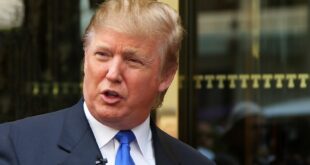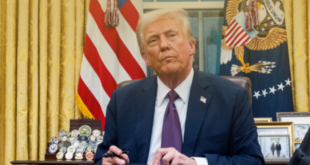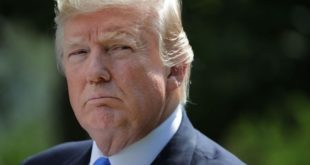A top US diplomat at an impeachment hearing has said that President Trump directly asked about a Ukrainian probe into his Democrat rival Joe Biden.
In previously unheard testimony, Bill Taylor, the acting US ambassador to Ukraine, said a member of his staff was told Mr Trump was preoccupied with pushing for a probe into Mr Biden.
He was speaking at the first public hearings in the impeachment inquiry.
Republicans branded the Democrat-led hearings a televised “spectacle”.
Mr Trump is accused of withholding US military aid to Ukraine in order to pressure the country’s new president to publicly announce a corruption inquiry into Mr Biden, among the favourites to take him on in the 2020 presidential race.
Mr Trump denies any wrongdoing and describes the impeachment inquiry as “another witch hunt”.
What did Trump allegedly ask about?
During a detailed opening statement, Mr Taylor said a member of his staff had overheard a telephone call in which the president inquired about “the investigations” into Mr Biden.
The call was with Gordon Sondland, the US ambassador to the European Union, who reportedly told the president over the phone that “the Ukrainians were ready to move forward”.
After the call, the staff member “asked ambassador Sondland what President Trump thought about Ukraine”, Mr Taylor said.
Mr Taylor said: “Ambassador Sondland responded that President Trump cares more about the investigations of Biden.”
When asked about Mr Sondland earlier this month, the president had said: “I hardly know the gentleman.”
The impeachment inquiry has been going on for more than a month – but all previous hearings were private, with reports based on leaks and sources speaking to the media.
Wednesday’s public hearings are the first time the public can hear from witnesses directly – and both Democrats and Republicans will be hoping to win over voters.
Why the new information matters
This has the potential to be a major twist. Although there have been reports of Mr Sondland’s direct line to the president, there has yet to be evidence tying Mr Trump directly to the alleged quid pro quo.
The phone call Mr Taylor described could change all that.
In the middle of Wednesday’s hearing, the House Intelligence Committee announced a new witness scheduled to give a closed-door deposition on Friday, an aide named David Holmes – reportedly the aide Mr Taylor mentioned.
Next week, Mr Sondland himself is scheduled to testify during public hearings.
If either of these two men support Mr Taylor’s account, it could undercut the president’s defenders who have suggested that Mr Trump was not closely involved in the activities of the “unofficial” channel of Ukraine policy, as Mr Taylor called it, which was pressuring Ukraine to open up investigations into the Bidens.
Democrats have reason to be pleased, while the president’s team has a new set of headaches.
What else happened at the hearing?
Wednesday’s hearing began with testimony from George Kent, a top US diplomat charged with overseeing European affairs.
He told the committee that President Trump’s private lawyer, Rudy Giuliani, ran a “campaign to smear” the US ambassador to Ukraine, Marie Yovanovitch, before she was recalled from her post.
Meanwhile, much of Mr Taylor’s other testimony repeated evidence he gave to private Congressional impeachment hearings, but he added new detail to the accounts in the public domain.
The career diplomat, who has served under Republican and Democratic presidents, reiterated his understanding that the Trump administration threatened to withhold military aid from Ukraine unless the Ukrainian president agreed to publicly announce an investigation into Mr Biden.
He testified that he told Mr Sondland and Kurt Volker, previously the US special envoy to Ukraine, that it would be “crazy” to withhold security assistance for the sake of domestic politics.
Adam Schiff, the Democratic Chairman of the Intelligence Committee overseeing the impeachment inquiry, said the purpose of the inquiry was to establish whether Mr Trump “abused his power and invited foreign interference in our elections”.
“If this is not impeachable conduct, what is?” he added.
The senior Republican on the Intelligence Committee, Devine Nunes, who is a staunch ally of the president, denounced the inquiry as “a televised theatrical performance staged by the Democrats”.
Learn more about Trump and impeachment inquiry
- SIMPLE GUIDE: A basic take on what’s going on
- GO DEEPER: Here’s a 100, 300 and 800-word summary of the story
- WHAT’S IMPEACHMENT? A political process to remove a president
- VIEW FROM TRUMP COUNTRY: Hear from residents of a Virginia town
- ON THE DOORSTEP: A Democrat sells impeachment to voters
What is Trump accused of?
The US House of Representatives is trying to establish whether Mr Trump abused the power of his office for personal gain.
In a phone call in July, the Republican president asked his Ukrainian counterpart to investigate Democratic White House contender Joe Biden. His son, Hunter Biden, worked for a Ukrainian gas firm while his father was US vice-president.
The US congressional inquiry has already heard that Mr Trump dangled nearly $400m (£327m) in military aid and a White House invitation in order to prod Ukraine’s leader to announce a corruption inquiry that might have caused political embarrassment to Mr Biden.
It is illegal to ask foreign entities for help in winning a US election.
Mr Trump has denied the allegations and branded the impeachment hearings a “phony showtrial”.
What is impeachment?
Impeachment is the first part – the charges – of a two-stage political process by which Congress can remove a president from office. If, following the hearings, the House of Representatives votes to pass articles of impeachment, the Senate is forced to hold a trial.
A Senate vote requires a two-thirds majority to convict and remove the president – unlikely in this case, given that Mr Trump’s party controls the chamber.
Only two US presidents in history – Bill Clinton and Andrew Johnson – have been impeached, but neither was convicted. President Richard Nixon resigned before he could be impeached.
BBC
 Home Of Ghana News Ghana News, Entertainment And More
Home Of Ghana News Ghana News, Entertainment And More





